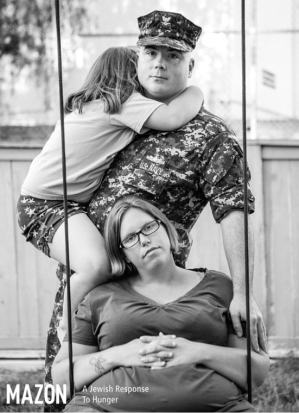
#MilitaryMonday: Veterans and Hunger
Our nation’s veterans have made innumerable sacrifices in service to our country. They have earned our gratitude and our support, and on Veterans Day our country formally honors them for that service.
If we are to truly make meaningful the tributes that we pay to our veterans, then surely, we should make certain that they can live with honor and dignity not only on Veterans Day, but every day. At a minimum, this must mean that they have enough to eat each and every day. The harsh reality is that too many veterans in our country struggle without access to the minimal food assistance they need and deserve. How many? The truth is, we don’t have official data to share, because neither the U.S. Department of Agriculture nor the Department of Veterans Affairs tracks this information. But we do know a few things that confirm that there’s a terrible problem here:
- A recent analysis by the Center for American Progress reveals that 3.9 million veterans – more than 1 in 5 – live paycheck to paycheck at 200 percent of or less than the federal poverty level.
- Feed Our Vets, a charity that runs food pantries serving veterans across the country, reports that 3 million veterans and their families do not have enough to eat each month.
- A study published in the journal Public Health Nutrition found that over one in four veterans of the wars in Iraq and Afghanistan reported struggling with food insecurity in the past year.
- The Center on Budget and Policy Priorities found that households with a veteran who has a disability that prevents him or her from working are about twice as likely to lack access to adequate food as households that do not include someone with a disability. As a reference point, more than a third (1.4 million) of recent veterans reported a service-connected disability in 2016.
Because of these discouraging statistics, MAZON took action. Time and again, we raised this issue with the Department of Veterans Affairs; when they failed to act, we persisted. Because of MAZON’s urging, for the first time, care team members at Veterans Affairs (VA) facilities will be required to screen for food insecurity among veterans coming for care. This activity is an essential first step that will help the VA identify veterans who struggle with food insecurity throughout the system.
“Even though the VA knew about our financial problems and my medical needs, no one ever mentioned any other options for assistance like SNAP or WIC. We didn’t know they even existed. . . . Eating better has really changed my life. . . . I want people who are going through financial difficulties to know that there is hope, that the resources are out there now, and that there is a light at the end of the tunnel.” - Joe Gaston from Bozeman, MT
But we recognize that this activity, important as it is, is only a first step. The VA must find more ways to connect food insecure veterans with nutrition assistance programs, like SNAP (the Supplemental Nutrition Assistance Program, aka food stamps), which can help them put food on the table. And it must come up with ways to reach the millions of veterans who don’t use VA hospitals or health clinics.
Those who make great sacrifices for our country should not have to worry about having enough food to eat. And MAZON will continue to press for change until that worry is a thing of the past.




The views and opinions expressed in this post are those of the author(s) and do not necessarily reflect those of MomsRising.org.
MomsRising.org strongly encourages our readers to post comments in response to blog posts. We value diversity of opinions and perspectives. Our goals for this space are to be educational, thought-provoking, and respectful. So we actively moderate comments and we reserve the right to edit or remove comments that undermine these goals. Thanks!